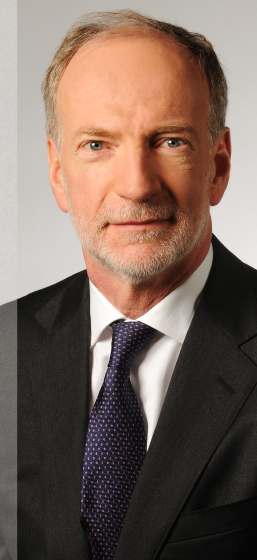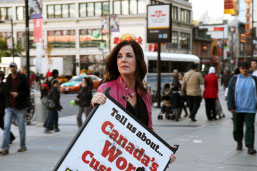




President and CEO
This year was about becoming more distinctly Canadian, more regional and more digital as we began putting our five-year Strategy 2015: Everyone, Every way into practice.
Strategy 2015 and
programming successes
Over the last year, we made tremendous headway toward achieving our 2015 objectives. You just have to look at our recent accomplishments to see how far we have come. CBC/Radio-Canada produced 31 signature events − far surpassing our original goal of 20 a year. Among these include projects such as 8th Fire, an innovative, collaborative, multi-platform series about aboriginal Canadians that aired on both CBC and Radio-Canada.
We are delivering more local news and have made great strides in strengthening our presence in the regions by launching new weekend and late-night programming in places like Edmonton and the North, and creating new micro websites for Montreal’s North and South Shores. We also launched two successful digital music services, CBC Music and Espace.mu, both generating more than a million audio streams in the first months
of their launch.
Our programming line-up in the heart of primetime is virtually 100 per cent Canadian during the television season. On CBC, we now broadcast 82 per cent Canadian programming during prime time, and for Télévision de Radio-Canada we are now up to 93 per cent in prime time. This is a testament to the fact that it’s CBC/Radio-Canada that has made Canadian content a priority.

CBC Television
In January 2012, CBC Television had the best launch of its history with new shows such as Arctic Air and Mr. D contributing to this great winter season launch. In addition, five shows pulled in audiences of more than a million viewers: these included CBC favorites such as Dragons' Den, Marketplace and Republic of Doyle.

Télévision de Radio-Canada
Télévision de Radio-Canada also continues to have great ratings, with shows like Les enfants de la télé, Tout le monde en parle, Enquête and Les Parent drawing more than a million viewers. The hilarious New Year’s show Bye Bye 2011 drew the largest audience in its history, with a combined total of almost 4.8 million people tuning in for broadcasts on December 31, 2011 and January 1, 2012.
CBC Radio is maintaining its overall upward trend that began several years ago, increasing its audience share by 1.5 share points in five years. New shows included This is That, Type A and ReCivilization. Radio de Radio-Canada numbers remained strong with an evening schedule that has now been enhanced with shows like Histoire d’objets and the literary program Plus on est de fous, plus on lit.
And in terms of extending our digital reach, CBC.ca’s online audience saw further growth, reaching an average of 6.2 million monthly unique visitors, while Radio-Canada.ca continued to break new ground with web-based documentaries like Le bruit des mots.
You can read more about these and other successes in the body of this report.
Transparency and accountability
As the national public broadcaster, CBC/Radio-Canada takes very seriously its obligation to be transparent and accountable to Canadians, and we have made great strides in this area over the past year. CBC/Radio-Canada is the only journalistic enterprise in the country subject to the Access to Information Act. When we first became subject to the Act in 2007, we experienced difficulty in dealing with the number of requests we received. But by the end of 2011, our “deemed refusal rate” − requests not responded to within the prescribed timeframe − had improved significantly, down to 4.2 per cent from 80.5 per cent in 2007−2008. In 2011, we also started posting an online Transparency and Accountability Bulletin, with regular updates on our performance.
In November 2011, the Federal Court of Appeal rendered a key judgment that clarifies the Access to Information Commissioner's powers over documents considered excluded from the Access to Information Act. Most importantly, the ruling confirmed unequivocally the exclusion for journalistic sources.
Canadians can access a wide variety of information about CBC/Radio-Canada’s activities and the way it manages public resources on its corporate website.
Financial pressures
Once again we are faced with significant financial pressures. As announced in the 2012 federal budget, CBC/Radio-Canada's appropriation has been reduced by $115 million over three years. This targeted reduction, combined with the unavoidable costs and investments required for CBC/Radio-Canada to continue to keep pace as a modern public broadcaster, means the Corporation actually faces financial pressures amounting to $200 million over the next three years.
In response, we announced that we will discontinue some services that are no longer priorities. This means shutting down analogue television transmitters and moving RCI broadcast from shortwave to the web. Unfortunately, we have also had to cut back on the number of languages RCI will broadcast in from seven to five.
CBC/Radio-Canada will also look to increase its revenues, reduce costs and do things differently. We intend to do this through increased advertising, leasing and selling real estate and by seeking CRTC approval to add advertising to CBC Radio 2 and Espace musique, all while applying strict standards to protect CBC/Radio-Canada’s brand. We will also implement more streamlined work and production methods, reduce costs of production, consolidate activities where possible, and reduce our overall real estate footprint. And we will continue to eliminate things that do not move us closer to achieving the goals we set out in Strategy 2015. The more we can do in these areas over the next three years, the more we will be able to protect activities tied to Strategy 2015, and our programming and the services we provide Canadians.

CBC/Radio-Canada
Still, at this point, we will need to scale back on the ambitions of our strategy to the tune of $30 million. For me, this is what hurts the most, because Strategy 2015 is about building our future. The reality is that we will not be able to go as far or as fast as we wanted with our local service extension plans. We will need to sell one specialty television channel and cancel the development and deployment of three others, eliminate a special fund to encourage cross-cultural programming that served both our English and French communities, and reduce the number of nation-building signature events we produce in a year.
The Corporation faces other funding risks as the CRTC conducts a three-year review of the Local Programming Improvement Fund (LPIF). The LPIF contributed approximately $40 million to CBC/Radio-Canada’s local programming in the 2010−2011 broadcast year ($21 million for French services and $19 million for English services). Among many other things, this allowed us to: increase local news programs in most markets; enhance coverage of local sports, special events, elections, breaking news and weather; and increase the presence of local news on the national network. Losing access to the LPIF would result in local television programming reductions of an equivalent amount and would certainly have an effect on viewers in small markets.
Moving forward
Despite what will be a sizeable reduction to our budget over the next three years, CBC/Radio-Canada still occupies a unique, prominent and valued place not only at the heart of Canadian culture and democratic life, but also as a cornerstone of an industry in upheaval.
Our commitment is to create public spaces where you can better understand and relate to the world, your country, your province, your city, your community and your neighbours, while confidently expressing your opinions and sharing your experiences.
Far from retrenching in the face of adversity and daunting challenges, I assure you we have our sights squarely set on extending CBC/Radio-Canada’s leadership in Canadian programming, regional presence and digital platforms.

Hubert T. Lacroix
President and CEO
